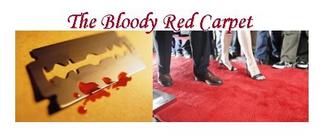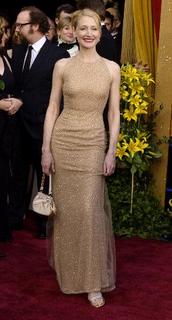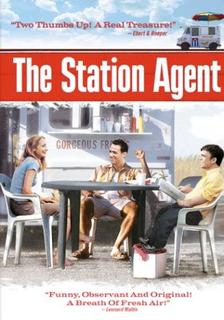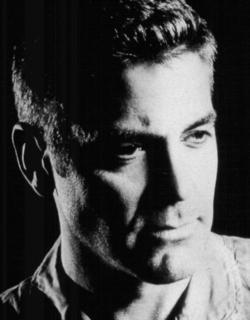Good Night, and Good Luck. - Movie Review
 Good Night, and Good Luck. 2005
Good Night, and Good Luck. 2005Once, not so long ago there was a Republican President in the White House, a conservative creep had crawled across the collective social landscape, and censorship was threatening to beat down our civil liberties like an unsatisfied john sucker punching a comatose whore. The time was 1954. The place was the good ole U.S. of A. And the conservative creep was one junior senator from Wisconsin, Joseph R. McCarthy. You see kids, some fifty years ago, the American citizenry had their girdles riding high over the fear of Communism sweeping their land, forcing their children to wear matching uniforms and sharing their Jell-O® with the less fortunate. Simply put, they didn’t like folks that weren’t supporting their President, had opposing viewpoints, or were too damn smart for their own good. These criminals were clearly all card carrying Communists, and they had to be sought out, questioned and done away with.
And then some smarmy New York City journalist stopped short, and said: “Hey! I don’t think so!” That big city Commie-lover was Edward R. Murrow. A celebrated pioneer in the “new” medium of television who felt that Freedom of Speech and the right to chain smoke six packs a day was the real backbone of America. And God Damn it! He was right! (Well, left. Whatever.)
Now, our good pal, Georgy Peorgy Clooney has gone all NYU Film School grad artsy director on us, and produced a black-and-white homage to this infamous battle of the talking heads that helped bring down the “Witch Hunts” of the McCarthy era. G.P. (as we’ll refer to him from now on) has assembled a wonderful cast of big names, little names, familiar faces and even threw in a Jazz Diva to help spin an entertaining primer into the politics of persuasion. His sophomore directorial effort is called: “Good Night, and Good Luck.” This was of course, Murrow’s famous closing tagline on his shows. We applaud our G.P. for his gumption, his guile and his incredibly sexy lips which look even more impressive in good lighting and on the big screen! (Oh, G.P.! The things we would like to do to you!)
 The film does a wonderful job of framing the action with Murrow’s legendary speech to a room filled with TV news types in 1958. A speech wherein he donkey punched the crowd for supporting television that was “being used to detract, delude, amuse and insulate us.” Way to bite the hand that lit your cigarette, Eddie! But it works. From the first scene, we know that Murrow is clearly a stubbornly principled man who was willing to stir up the pot in order to get his message across. From here, we flashback to 1954, and Murrow’s team deciding on topics for future shows. They choose to go with a story about a military man who was thrown out of the armed services for his father’s alleged ties to Communism. These allegations were never detailed, nor did the soldier ever receive a trial and this just burns Edward. It forces him to smoke at least three ciggies before he decides the next big fish to gut should be Sen. Joseph R. McCarthy. Supported by his producer chum, portrayed by the delectable G.P. himself, Murrow does his homework and portrays the Senator as the bloated, pompous fool he is by showing damaging clips from the donkey’s own mouth. The war is on. CBS top man, William S. Paley, portrayed elegantly and powerfully by Frank Langella is willing to support Murrow only so far, as long as the ratings are there and they can manage to avoid a full out attack by H.U.A.C.
The film does a wonderful job of framing the action with Murrow’s legendary speech to a room filled with TV news types in 1958. A speech wherein he donkey punched the crowd for supporting television that was “being used to detract, delude, amuse and insulate us.” Way to bite the hand that lit your cigarette, Eddie! But it works. From the first scene, we know that Murrow is clearly a stubbornly principled man who was willing to stir up the pot in order to get his message across. From here, we flashback to 1954, and Murrow’s team deciding on topics for future shows. They choose to go with a story about a military man who was thrown out of the armed services for his father’s alleged ties to Communism. These allegations were never detailed, nor did the soldier ever receive a trial and this just burns Edward. It forces him to smoke at least three ciggies before he decides the next big fish to gut should be Sen. Joseph R. McCarthy. Supported by his producer chum, portrayed by the delectable G.P. himself, Murrow does his homework and portrays the Senator as the bloated, pompous fool he is by showing damaging clips from the donkey’s own mouth. The war is on. CBS top man, William S. Paley, portrayed elegantly and powerfully by Frank Langella is willing to support Murrow only so far, as long as the ratings are there and they can manage to avoid a full out attack by H.U.A.C.
And while non of this may seem that exciting or cinematic on the written page, well then, neither did “All the President’s Men” or “The Contender.” Both of those political intrigue flicks share a similar bond with “Good Night, and Good Luck.” They attempt to represent the values of character and nobility fighting a government that would be happier ignoring intellectual debates, hoping to find supporters that merely tow the line. This kind of sounds familiar, but for the life of us, we just can’t put our finger on it. Anyway, the cinematography is wonderfully atmospheric, black-and-white instantly kicking us back decades. (Since, as you all know, color didn’t exist until 1990.) The art direction and set decoration capture the feel of the CBS newsrooms, and the costume design recreates all the high waisted slacks, and streamlined skirts of the period brilliantly. Patricia Clarkson in particular looks ravishing! Dianne Reeves, less so. But then, we were never fans of the short crinkly do that black woman wore in those days. We suppose the gals hadn’t yet discovered a good hair weave. Shame, it coulda helped. But Diva Reeves needs absolutely no help in the singing department. G.P. uses her as a scene palette cleanser, belting out standards that tie in beautifully to the text, and steeping us in the period. A stand out is her interpretation of “How High the Moon”, man that bitch can sing! (Go out now and buy the soundtrack, chock full of great tunes.) Kudos are in order to other cast members: Robert Downey Jr. as Patricia Clarkson’s clandestine husband (Apparently it was CBS law that no married couples could work together – hell, we think most shouldn’t even live together!) Tate Donovan (yes, him . . . former Jennifer Aniston fuck buddy) and Tom McCarthy (no relation to the villain of the piece . . . but still an awesomely talented actor / writer / director who charmed the panties off us two years ago with his major directorial debut, “The Station Agent.” Which, if you will remember featured another brilliant performance by Patricia Clarkson - go rent it NOW!!!
Kudos are in order to other cast members: Robert Downey Jr. as Patricia Clarkson’s clandestine husband (Apparently it was CBS law that no married couples could work together – hell, we think most shouldn’t even live together!) Tate Donovan (yes, him . . . former Jennifer Aniston fuck buddy) and Tom McCarthy (no relation to the villain of the piece . . . but still an awesomely talented actor / writer / director who charmed the panties off us two years ago with his major directorial debut, “The Station Agent.” Which, if you will remember featured another brilliant performance by Patricia Clarkson - go rent it NOW!!!
 There are other familiar faces and perfectly cast character actors in the piece, but the one that took our breath away - twice no less, is Ray Wise. Most of you will know him from his maniacally twisted performance as Laura Palmer’s father in the “Twin Peaks” television show / feature film franchise. God. We miss that show. Come back, Log Lady, come back! Anywho, Mr. Wise hits the bullseye with his portrayal of a CBS anchorman who idolizes Murrow, but cannot escape his own private “witch hunt.”
There are other familiar faces and perfectly cast character actors in the piece, but the one that took our breath away - twice no less, is Ray Wise. Most of you will know him from his maniacally twisted performance as Laura Palmer’s father in the “Twin Peaks” television show / feature film franchise. God. We miss that show. Come back, Log Lady, come back! Anywho, Mr. Wise hits the bullseye with his portrayal of a CBS anchorman who idolizes Murrow, but cannot escape his own private “witch hunt.”
Quibblers might complain that the use of archive footage of Senator McCarthy disrupts the flow of the film, but we wholeheartedly disagree. By using extended clips from the Senate committee hearings, we get a feel for the outrageousness of the situation, along with the disgusting sweaty quality that the actual man exuded. We also get a glimpse into the atmosphere of fear that gripped the nation, the reptile hypocrisy of Roy Cohn, McCarthy’s chief counsel and personal ass licker and the famed bitchslap that shamed McCarthy courtesy of Special Counsel for the Army Joseph N. Welch.
“You've done enough. Have you no sense of decency, sir, at long last? Have you left no sense of decency?” So, in closing we would just like to add, that we really don’t see the connection between the McCarthy era and the Dubya era. But we really enjoyed the movie! Thanks, G.P.! We love you. We mean it! Call us! We encourage all who care about smart and sassy filmmaking to run out a buy a ticket, now! Just be sure that if you are a smoker, you beat at least three heaters prior to entering the lobby. And take a patch, gum and some chaw with you, ‘cause the folks onscreen average about seventeen smokes per second! Whew! We barely made it out of the theatre in time to light one up ourselves. And we apologize to the old woman we mowed down in front of the revolving door. Sorry, granny, but you were slowing us down. Bless you all!
So, in closing we would just like to add, that we really don’t see the connection between the McCarthy era and the Dubya era. But we really enjoyed the movie! Thanks, G.P.! We love you. We mean it! Call us! We encourage all who care about smart and sassy filmmaking to run out a buy a ticket, now! Just be sure that if you are a smoker, you beat at least three heaters prior to entering the lobby. And take a patch, gum and some chaw with you, ‘cause the folks onscreen average about seventeen smokes per second! Whew! We barely made it out of the theatre in time to light one up ourselves. And we apologize to the old woman we mowed down in front of the revolving door. Sorry, granny, but you were slowing us down. Bless you all!
Note: We thought we’d throw in this famous quote from Edward R. Murrow just for the hell of it. Again, absolutely no connection to the current administration.
“We cannot defend freedom abroad by deserting it at home.”
Directed by George Clooney
Written by George Clooney & Grant Heslov
Starring
David Strathairn as Edward R. Murrow
George Clooney as Fred Friendly
Robert Downey Jr. as Joe Wershba
Patricia Clarkson as Shirley Wershba
Frank Langella as William Paley
Ray Wise as Don Hollenbeck
Jeff Daniels as Sig Mickelson
Tate Donovan as Jess Zousmer
Tom McCarthy as Palmer Williams
Grant Heslov as Don Hewitt
Alex Borstein as Natalie
Dianne Reeves as Jazz Singer
Film Editing by Stephen Mirrione
Cinematography by Robert Elswit
Costume Design by Louise Frogley
Production Design by James D. Bissell
Art Direction by Christa Munro
Set Decoration by Jan Pascale


<< Home